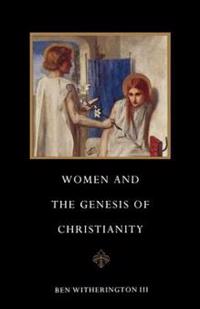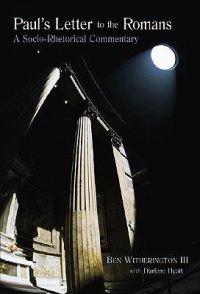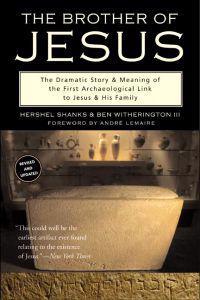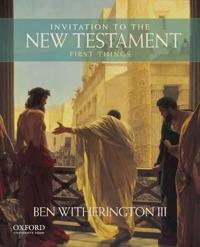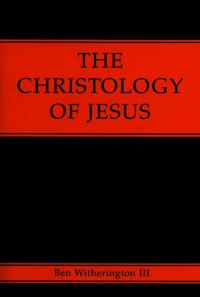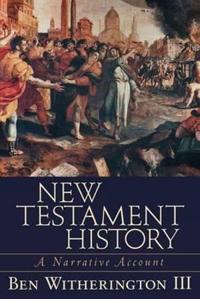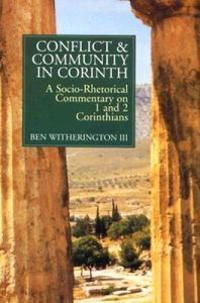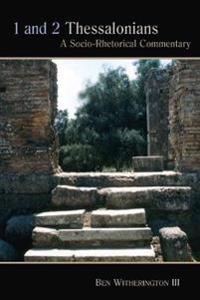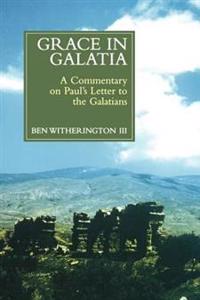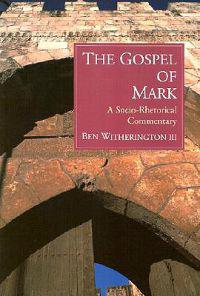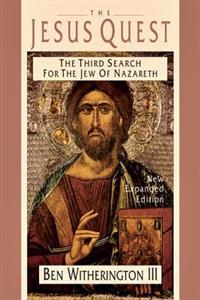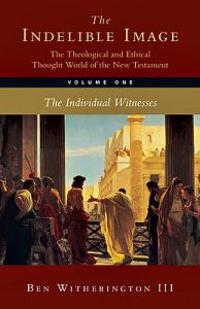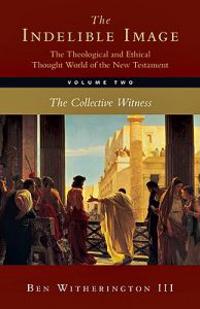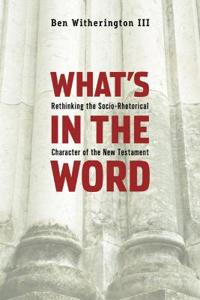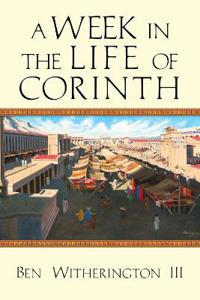Women and the Genesis of Christianity (Pocket)
avBen Witherington, Ann Witherington, Ben Witherington
ISBN: 9780521367356 - UTGIVEN: 1990-09This book presents in as clear a way as possible the New Testament material dealing with women and their roles in the context of the movement Jesus began. Dr Witherington begins by illustrating the roles of women in Judaism, in the Hellenistic world, and in the Roman Empire. She goes on to show how [...]
Paul's Letter to the Romans (Pocket)
avBen Witherington, Darlene Hyatt, Ben Witherington
ISBN: 9780802845047 - UTGIVEN: 2004-03While Paul's letter to the Romans is the most studied and commented-on document from the biblical period, the major exegetical books on Romans from the nineteenth and twentieth centuries have been overwhelmingly shaped by the Reformed tradition. Through a careful survey of work on Romans by both anc[...]
The Brother of Jesus: The Dramatic Story & Meaning of the First Archaeological Link to Jesus & His Family (Häftad)
avHershel Shanks, Ben Witherington
ISBN: 9780060581176 - UTGIVEN: 2004-03The first definitive account of what scholars and the media are calling 'the most important archaeological discovery' about Jesus and his family. This is the definitive story of the recent discovery of the first-century ossuary (limestone bone box) with the legend 'James, son of Joseph, brother of J[...]
Invitation to the New Testament (Inbunden)
avIII Ben Witherington
ISBN: 9780199920525 - UTGIVEN: 2013-01Writing with his usual flair and reader-friendly style, renowned scholar, author, and lecturer Ben Witherington offers a balanced approach to the New Testament in this exceptional introductory text. Addressing the content, context, and interpretation of the New Testament in a faith-friendly light, I[...]
Is There a Doctor in the House? (Häftad)
avIII Ben Witherington
ISBN: 9780310493020 - UTGIVEN: 201108Revelation (Pocket)
avBen Witherington
ISBN: 9780521000680 - UTGIVEN: 2003-09This is the first of its kind: an innovative socio-rhetorical commentary on the Book of Revelation. Without sacrificing scholarly perspective or academic rigor, it is written to be accessible for a wide audience - including pastors, scholars, teachers, seminarians, and interested lay people. A ?Sugg[...]
Paul's Letter to the Philippians (Pocket)
avBen Witherington
ISBN: 9780802801432 - UTGIVEN: 2011-10Interprets Paul?'s letter in light of its rhetorical content and cultural context
Skeptical of the trend among many biblical scholars to analyze Paul?'s short, affectionate letter to the Philippians in light of Greco-Roman letter-writing conventions, Ben Witherington instead looks at Philippians[...]Conflict and Community in Corinth (Häftad)
avBen Witherington
ISBN: 9780802801449 - UTGIVEN: 199612This unprecedented commentary applies an exegetical method informed by both sociological insight and rhetorical analysis to the study of 1 and 2 Corinthians. In addition to using traditional exegetical and historical methods, this unique study also analyzes the two letters of Paul in terms of Greco-[...]
1 and 2 Thessalonians (Pocket)
avBen Witherington
ISBN: 9780802828361 - UTGIVEN: 2006-11Paul's two letters to the Thessalonians stand as some of the very earliest Christian documents, yet they appear quite late in Paul's missionary career, giving them a unique context well worth exploring. In this first full-scale socio-rhetorical commentary on "1 and 2 Thessalonians", Ben Witherington[...]
Grace in Galatia: A Commentary on Paul's Letter to the Galatians (Häftad)
avBen Witherington
ISBN: 9780802844330 - UTGIVEN: 1998-06Grace in Galatia is an innovative socio-rhetorical study of Paul's most polemical letter. Ben Witherington breaks new ground by analyzing the whole of Galatians as a deliberative discourse meant to forestall the Galatians from submitting to circumcision and the Jewish law. The commentary features th[...]
The Gospel of Mark (Pocket)
avBen Witherington
ISBN: 9780802845030 - UTGIVEN: 2001-01"This commentary offers the first sustained attempt to read the Gospel of Mark both as an ancient biography and as a form of ancient rhetoric. Ben Witherington applies to Mark the socio-rhetorical approach for which he is well known, opening a new perspective on the earliest Gospel that also emphasi[...]
Letters and Homilies for Hellenized Christians, Volume II: A Socio-Rhetorical Commentary on 1-2 Peter (Inbunden)
avBen Witherington
ISBN: 9780830829330 - UTGIVEN: 2008-01Letters and Homilies for Hellenized Christians, Volume 2 is the third of three volumes extending Ben Witherington's innovative socio-rhetorical analysis of New Testament books to the latter-Pauline and non-Pauline corpora. By dividing the volumes according to the socioreligious contexts for which th[...]
The Indelible Image: The Theological and Ethical Thought World of the New Testament: Volume 1: The Individual Witness (Inbunden)
avBen Witherington
ISBN: 9780830838615 - UTGIVEN: 2009-08The Indelible Image: The Theological and Ethical Thought World of the New Testament, Volume Two: The Collective Witness (Inbunden)
avBen Witherington
ISBN: 9780830838622 - UTGIVEN: 2010-04New Testament Rhetoric: An Introduction Guide to the Art of Persuasion in and of the New Testament (Häftad)
avBen Witherington
ISBN: 9781556359293 - UTGIVEN: 2008-10Making a Meal of It (Pocket)
avBen Witherington
ISBN: 9781602581906 - UTGIVEN: 2007-11Making a Meal of It explores the background and implication of the Lord's Supper. Delving into its historical and Scriptural origins, Witherington argues that the Lord's Supper is a sacramental celebration of the community of God, designed to incorporate people of varying backgrounds. Excavating t[...]
The Living Word of God (Pocket)
avBen Witherington
ISBN: 9781602581920 - UTGIVEN: 2007-10In this final installment of his trilogy on the central ordinances of the Christian faith (baptism, the Lord's Supper, and the proclamation of God's Word), Ben Witherington asks: What does it mean to call the Bible "God's word"? In doing so, he takes on other recent studies which downplay the conne[...]
Troubled Waters (Häftad)
avIII Ben Witherington
ISBN: 9781602581937 - UTGIVEN: 2010-07Baptism has been a contested practice from the very beginning of the church. In this volume, Ben Witherington rethinks the theology of baptism and does so in constant conversation with the classic theological positions and central New Testament texts. By placing baptism in the context of the coven[...]
What's in the Word (Pocket)
avBen Witherington
ISBN: 9781602581968 - UTGIVEN: 2009-08Written in clear, and at times colorful, prose, Ben Witherington's What's in the Word explains how the recognition of the oral and socio-rhetorical character of the New Testament and its environment necessitates a change in how the New Testament literature is read. Expanding on the work in which [...]
A Week in the Life of Corinth (Häftad)
avBen, III Witherington
ISBN: 9780830839629 - UTGIVEN: 201203Ben Witherington III attempts to reenchant our reading of Paul in this creative reconstruction of ancient Corinth. Following a fictitious Corinthian man named Nicanor through an eventful week of business dealings and conflict, you will encounter life at various levels of Roman society--eventually me[...]

